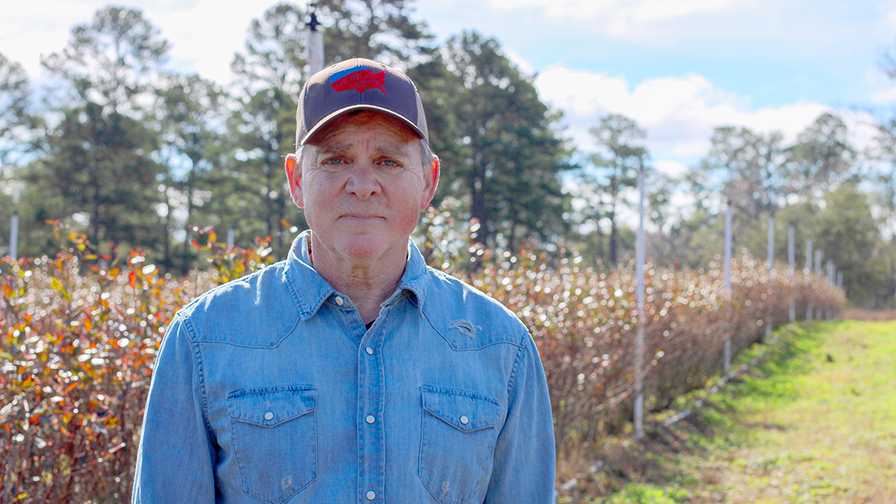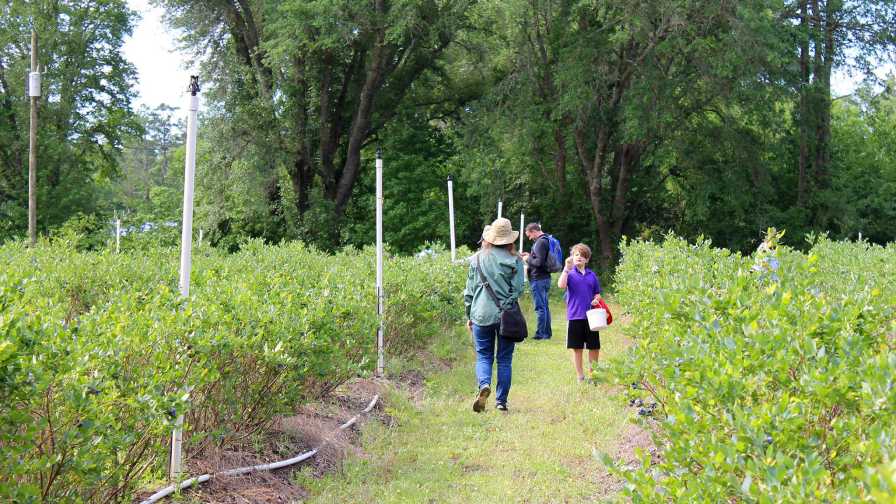Want to Grow Demand for American Produce? Here’s One Way

While relatively new to farming, it didn’t take long for Bud Chiles to appreciate the market disruption foreign imports were having on his and others’ businesses.
Photo courtesy of Demand American Grown
Lawton “Bud” Chiles is new to farming but has quickly developed a passion for the profession. He and his wife Kitty own and operate Jubilee Orchards — a 50-acre organic blueberry farm just east of Tallahassee, FL. The farm is located on a plantation Chiles inherited from his father Lawton Chiles — who served as Florida’s Governor in the 1990s.
“My wife and I decided we wanted to do something on the land,” Chiles says. “We had both done the traveling and corporate thing, so we got into blueberries in a pretty big way starting about six years ago.”
The local community has embraced the farm. Chiles says 800 to 1,000 people visit the farm on weekends during the season to pick berries and enjoy other activities like pony rides and hayrides, the onsite farm store, music, and food.
“It has become a great family attraction to come out to Jubilee to pick blueberries,” he says.
Trade Pressure
While relatively new to farming, it didn’t take Chiles long to appreciate the massive disruption Mexican imports have wrought on Florida and the Southeast blueberry market window. The U-Pick side of the business has enjoyed great success, but it moves only a small portion of the blueberries grown on the farm. The bulk of what is grown is sold through a marketer to the commercial retail chain.
On the retail side, Chiles noticed that fruit from Argentina and Chile would be held over at the beginning of Florida’s market and, increasingly, Mexican berries started coming in during the middle of the season.
“Unfortunately, that whole process started to accelerate right about the time we first started planting our orchard,” he says. “If we had not gone organic, I believe I would have trouble sleeping at night because that does provide a little competitive edge against the imports.”
Mexican blueberry production has been ramping up at a staggering pace. Just last season, Mexico exported twice as much fruit into the U.S. than Florida could actually grow. They have a big advantage on labor wages, paying workers 60 cents to $1 per hour to harvest fruit. A trade analysis study conducted by UF/IFAS notes blueberry imports from Mexico experienced a 34-fold increase from 2010 to 2018.
Blueberries are not the only crops facing trade pressure from Mexico. From 2010 to 2018, tomato imports increased by 23%, 56% for bell peppers, and 79% for strawberries. In that same period, the value of these commodities’ imports rose from $2.16 billion to $3.76 billion — a 74% increase. In 2017, total U.S. imports of all fruits and vegetables from Mexico came to nearly $12 billion.
Taking Action
As Florida’s blueberry market window began to shrink, Chiles decided it was time to act, and he believed a grassroots movement would be most effective. Last summer, he organized a meeting of blueberry growers from Georgia and Florida in Lake City.
“I didn’t know what to expect; maybe 25 growers would show up,” he says. “But it was packed — standing room only with more than 100 people. Coming away from that meeting and hearing growers’ stories, it became clear to me that we are at a tipping point. And we can’t really depend on traditional organizations and fixes from state and federal policy.
“Do we really want to be dependent on Mexico [and other South American countries] for our food supply? This is a serious national security issue, and it is not happening on a slow basis. More than 100,000 farms have been foreclosed in the past four years. There have been thousands of farms going out [of business] in Florida and Georgia.”
That first meeting set the course for the development of DemandAmericanGrown.org. The website and movement were announced in January in Savannah at the Southeast Regional Fruit and Vegetable Conference. The campaign utilizes social media, a telephone hotline, and other tactics to communicate the dire situation American farms are facing and to encourage consumers to choose domestic and locally grown produce. He says the initial reaction to Demand American Grown has been encouraging.

Ryan Atwood, a blueberry grower and current President of the Florida Blueberry Growers Association, was on hand during a press event in Savannah announcing Demand American Grown.
Photo by Chuck Zimmerman
“We now have groups organized in Florida, Georgia, and Michigan,” Chiles says. “We are expanding into New Jersey, North Carolina, and California. We are using social media to get the stories out, and we are hearing from growers from all over the country. We must encourage consumers to buy our product when in season and to have them persuade their retailers to carry American-grown products in their stores. This is something people need to awaken to. I believe these folks want to support local farming, but they have to hear the stories.”
Ryan Atwood, a Central Florida blueberry grower, currently is serving as President of the Florida Blueberry Growers Association. He was on hand during the press event in Savannah to lend support for the effort.
“As growers, we have to get organized because the new trade pact — United States-Mexico-Canada-Agreement (USMCA) — is not going to save us, and the government is not going to save us,” Atwood says. “We are not going to make it if we don’t start educating the consumer on the importance of American farms and American produce. I am all about action, so I appreciate that Bud is making the effort.”

While Jubilee Orchard’s U-Pick operation is very popular, it accounts for only a small portion of the North Florida farm’s annual production. The operation’s owner is one of the forces behind the new Demand American Grown initiative. Photo courtesy of Demand American Grown
Moving Forward
While the focus of Demand American Grown currently is building participation and momentum, Chiles says the effort has some future objectives in mind including reforms at UDSA.
“Right now, it appears that USDA subsidies mostly favor the larger players,” he says. “We want to advocate rational USDA reforms that will benefit all sizes of farms.
“In addition, the agency spends pennies on climate change. We need policies that help growers deal with climate issues. Carbon farming by growers is probably one of the best things we could do in this country to reduce carbon levels. Why are we not funding farmers to sequester carbon?”
A certification program also is being considered that would guarantee produce is American grown.
“We have the state marketing programs like Fresh From Florida and Georgia Grown, but our label would add another level of accountability and insurance that consumers are getting locally grown product.”
Get Involved
Chiles says the Demand American Grown effort will only be successful if growers in Florida and beyond get involved and share their stories.
“I have worked on a lot of important issues in my life, but I believe this is one of the most important,” he says. “It is daunting to start a national movement, but we must correct this situation and provide American farmers a fair, level playing field. We have been really gratified by the response so far. We have a real opportunity here to pull Americans together in support of a great cause.”
How to Demand American Grown
If you are interested in joining the conversation and sharing your farm story, there are a number of ways to engage:
- Visit the website: DemandAmericanGrown.org
- Call the hotline: 855-USGROWN (855-874-7696)
- Social media: on Facebook @DemandAmericanGrown
Like this article? Go ahead and click the “Applause” button below. And feel free to leave a reader comment.










